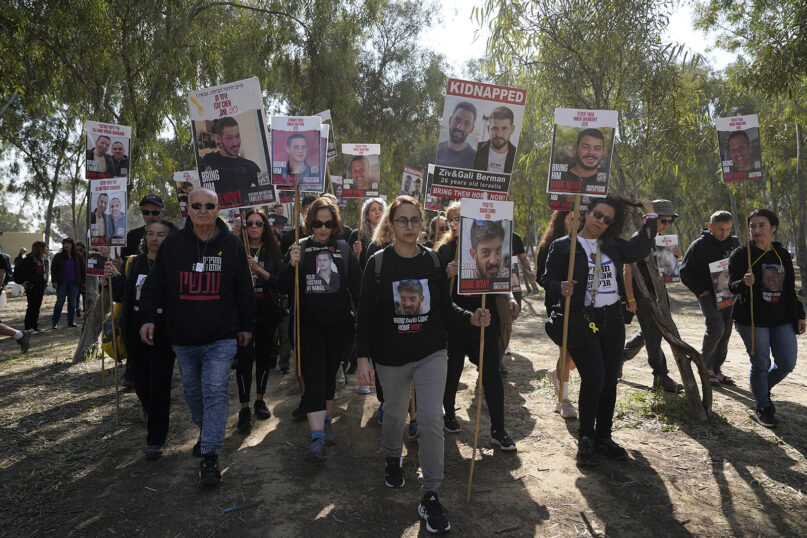NASHVILLE, Tenn. (RNS) — For the last five months, Moshe Lavi has worn a medallion around his neck in honor of his brother-in-law Omri Miran, who was taken hostage by Hamas during the Oct. 7 attack on Israel.
Inscribed on the steel medallion, modeled after the dog tags worn by Israeli soldiers, is a simple drawing of a house with part of one wall missing. Inside the walls of the house is a heart.
“This represents the love that is in our family, but it’s incomplete,” said Lavi, a former Israel Defense Forces captain who was in Nashville last week to attend the annual National Religious Broadcasters meeting.
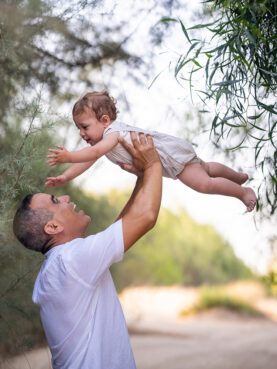
Omri Miran with his daughter, Roni. (Photo © Noa Sharvit)
“It will be complete only when we return Omri home,” he said.
Lavi, who now works as a financial analyst, and other members of the Hostages and Missing Families Forum were among a large contingent of Israelis — including government officials — at the NRB gathering to meet with evangelical leaders, radio and television hosts, and other Christian supporters of Israel.
They were there because evangelicals remain key allies for Israel in a time when the nation is losing support around the world.
“Evangelicals as a bloc are about the only friends that Israel has,” said Joel Rosenberg, a longtime political strategist, novelist and editor-in-chief of All Israel News, an evangelical pro-Israel news and commentary site.
Rosenberg, who became an Israeli citizen about a decade ago and identifies as a Jewish believer in Jesus, told Religion News Service that he saw more Israelis at the NRB this year than in the past.
That’s in large part due to the close ties between Israel and evangelicals, who are more loyal than other groups, said Rosenberg, host of “The Rosenberg Report” for the Trinity Broadcasting Network.
“Where else are you going to find people who will listen, and then have a platform and a motive to act,” he said.
Evangelical Christians have long been the backbone of U.S. support for Israel and are arguably among Israel’s most ardent advocates. They travel to Israel in great numbers. They donate vast sums of money and advocate for Israel in Republican Party circles.
After the Oct. 7 Hamas attack in southern Israel killed an estimated 1,200, evangelicals jumped to defend Israel and raise money to rebuild its border communities. The Southern Baptist Convention’s public policy arm issued an “Evangelical Statement in Support of Israel.”

A Magen David Adom ambulance on display during the National Religious Broadcasters convention at the Gaylord Opryland Resort and Convention Center in Nashville, Tenn. (RNS photo/Bob Smietana)
Evangelist Franklin Graham donated 21 new ambulances to Israel’s EMS fleet, known as Magen David Adom, becoming the national nonprofit’s largest donor, said Catherine Reed, CEO of American Friends of Magen David Adom.
“The evangelical community loves Israel,” said Reed, who brought her team, including an Israeli ambulance and a series of short videos about the nonprofit, to the exhibition floor of the National Religious Broadcasters meeting as a way to thank evangelicals for their support.
RELATED: Franklin Graham tours devastation in Israel, commits to helping rebuild
Reminders of the Oct. 7 attacks were everywhere at the conference. Not far from the exhibitors hall, conference attendees could watch “Bear Witness,” a three-minute video of the Hamas attacks using virtual headsets. The exhibit where the video was being shown was flanked by Israeli flags and Nashville Metro police officers providing added security.
A few floors up, a 45-minute version of the video — taken from footage filmed by Hamas — was being shown to groups of pastors, broadcasters and other attendees. After watching the footage, the groups heard from families of hostages and IDF officers. The videos have also been shown around the country to build support for Israel after the attacks.
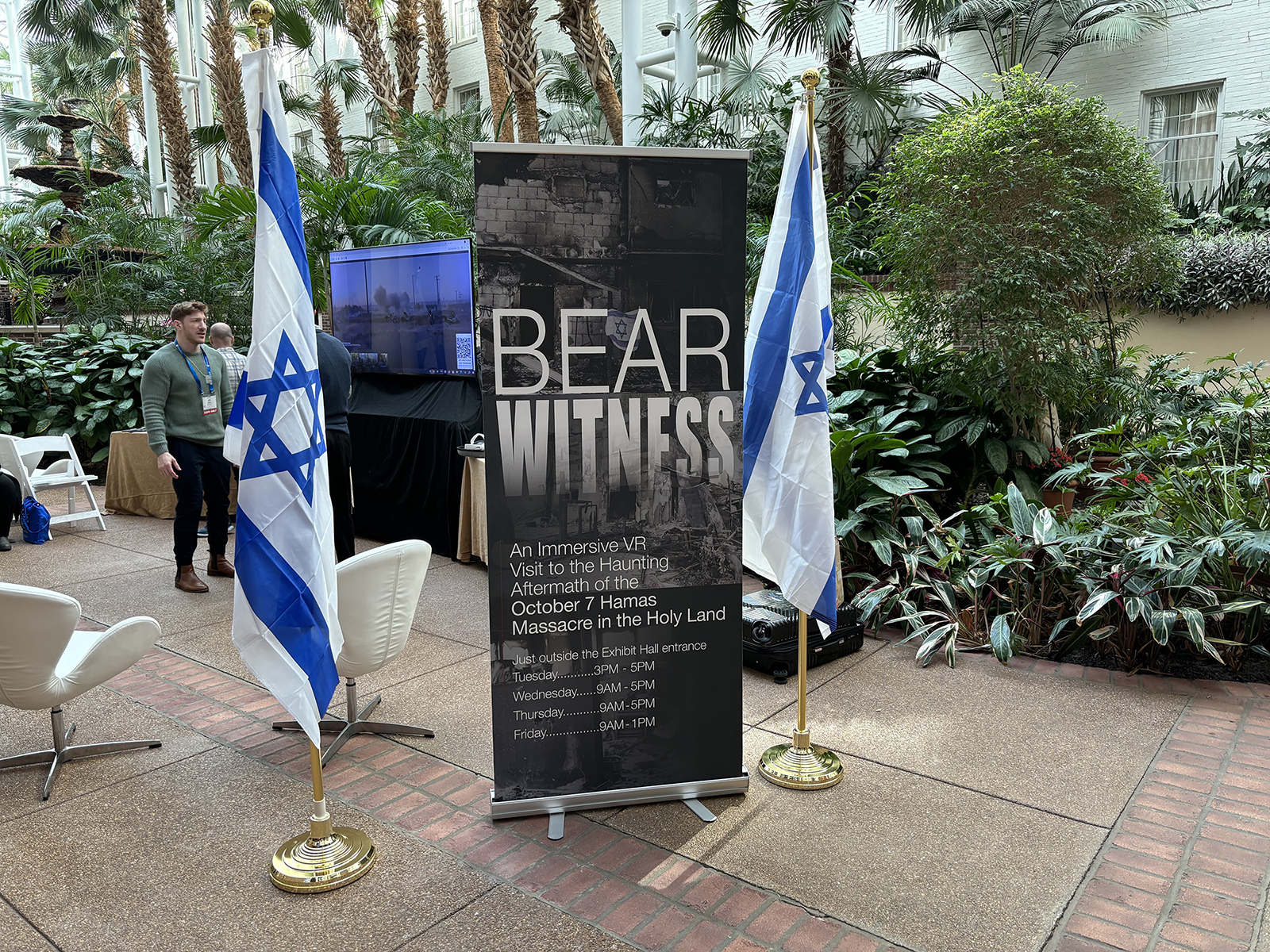
“Bear Witness” experience during the National Religious Broadcasters convention at the Gaylord Opryland Resort and Convention Center in Nashville, Tenn. (RNS photo/Bob Smietana)
There is good reason for Israel to woo evangelicals. They are mightier in numbers than Jews, said Dov Waxman, professor of Israel studies at the University of California, Los Angeles.
“Many people, when they think about Zionists in America, think about Jewish Americans,” said Waxman. “But in actual fact, there are many, many more Christian Zionists than there are Jewish Zionists in the United States.”
Exactly how many is hard to estimate. Mordechai Inbari, a professor of religion at the University of North Carolina, Pembroke, found of the estimated 80 million U.S. evangelicals, between 50% to 70% support Israel.
By contrast, there are close to 8 million Jews in the U.S. Those Jews tend to be far more liberal and vote Democratic. Far-left U.S. Jews have been among the most passionate critics of the war in Gaza, calling for a cease-fire in petitions and protests.
Christian support for Israel has often been rooted in beliefs about the end times. For some evangelicals, the creation of the state of Israel in 1948, and its ability to capture the West Bank and Gaza in the 1967 Six-Day War, reinforced the belief that Israel is the culmination of prophecies recorded in the Bible and may presage the second coming of Jesus.
However, that belief seems to hold less sway in the current conflict than larger claims about God’s promises to Israel.
“The most common argument right now would be that God made a covenant with Abraham and his offspring and this is why they need to support Israel,” said Inbari, the co-author with Kirill Bumin of “Christian Zionism in the Twenty-First Century.”
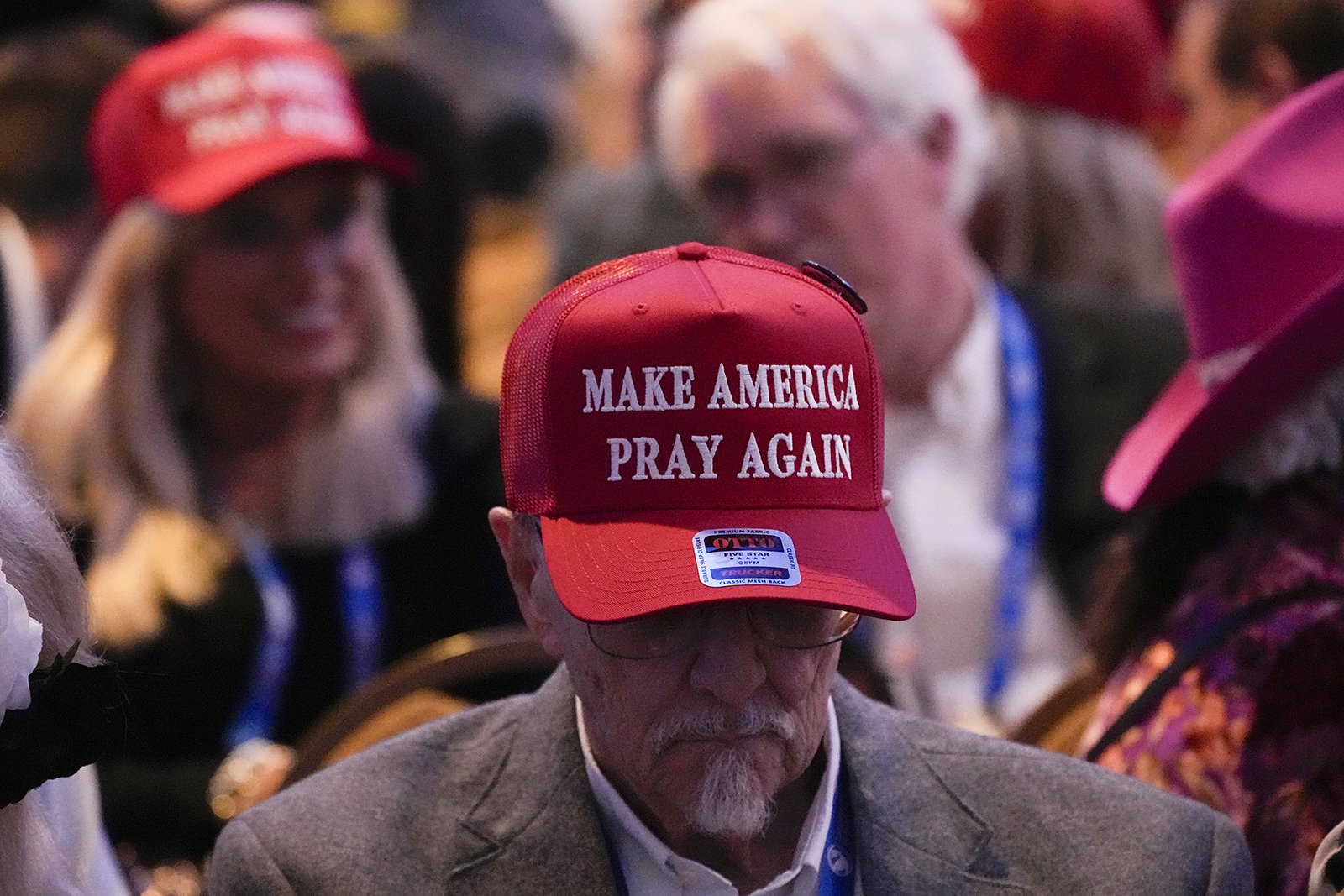
A man wears a “Make America Pray Again” hat at the National Religious Broadcasters convention at the Gaylord Opryland Resort and Convention Center, Feb. 22, 2024, in Nashville, Tenn. (AP Photo/George Walker IV)
During NRB, several speakers cited a passage from the Book of Genesis where God tells Abraham, one of the patriarchs of Israel, “I will bless those who bless you, and whoever curses you I will curse.” A similar claim is found in the Book of Numbers.
But younger evangelicals are more skeptical about ties to Israel and have become more supportive of Palestinians. In three waves of a survey that examined evangelical views of Israel, Inbari and Bumin found that among evangelicals aged 19-29, support for Israel dropped by more than half, from a high of 69% in 2018 to 29% in July 2021.
With declining evangelical support among young evangelicals and growing global condemnation of Israel’s ongoing military operation in Gaza, where the death toll is reported to be approaching 30,000, Israeli leaders are working to strengthen evangelicals’ advocacy for their country.
“Firming up support for Israel among the evangelical community is really essential, and (Israeli leaders) see that as playing a key role in maintaining U.S. government support for Israel,” Waxman said.
Laurie Cardoza-Moore, a longtime activist for Israel based near Nashville and founder of the pro-Israel group Proclaiming Justice to the Nations, spent last week interviewing survivors of the Hamas attacks and other Israelis for her “Focus on Israel” podcast and connecting with supporters at a booth in NRB’s massive exhibit hall.
The images from the Oct. 7 attack were shocking, said Cardoza-Moore. But the stories of survivors bring the attack closer to home.
“When you meet the people and you hear the stories — that’s what changes people’s hearts,” she said.
Cardoza-Moore, a longtime presence at NRB, began her pro-Israel work in the early 2000s, spearheading a Tennessee resolution in support of Israel in 2002.
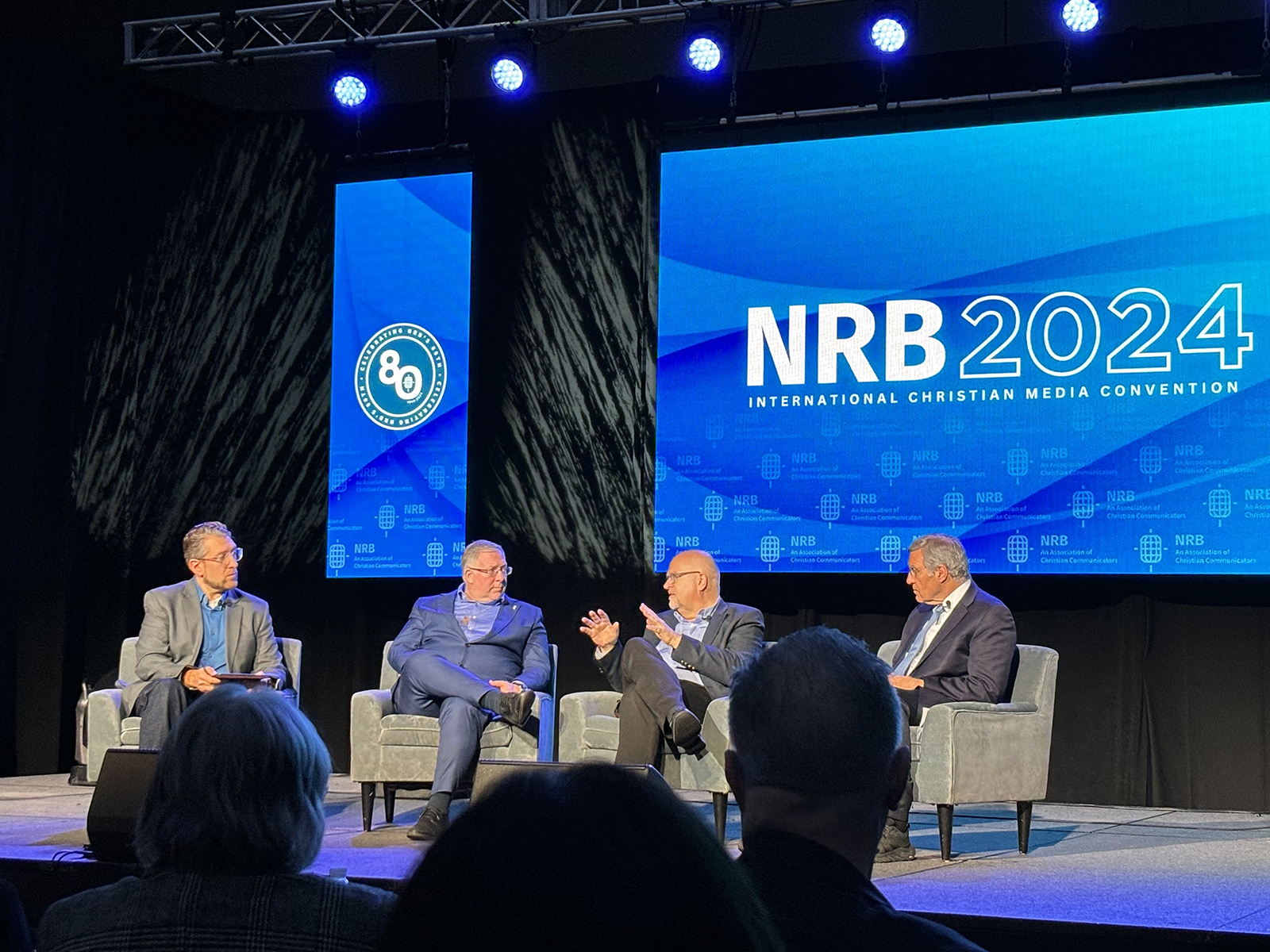
A panel on Israel during the National Religious Broadcasters convention at the Gaylord Opryland Resort and Convention Center in Nashville, Tenn. (RNS photo/Bob Smietana)
Evangelicals, she said, have a responsibility to defend both Israel and their Jewish neighbors.
“Antisemitism never goes away,” she said. “We need to protect our Jewish brethren — and we as Christians have a biblical duty to do that, according to the Scriptures.”
Luke Moon, deputy director of the Philos Project, which promotes “positive Christian engagement in the Near East,” said evangelicals need to be more intentional and clearer in their support of Israel. Moon, who had a booth at the NRB, said he recently attended a major youth conference where he set up a sign that said, “We are the Zionist generation.”
The same sign, he said, was set up at the NRB booth.
For years, the nonprofit has taken Christian leaders on education trips to Israel — something that is on hold due to the war. The work now has shifted to building solidarity with Israel.
Moon said the Oct. 7 attacks revealed that Philos has a great deal of work to do.
“I thought the world of allies to the Jewish people was bigger,” he said.
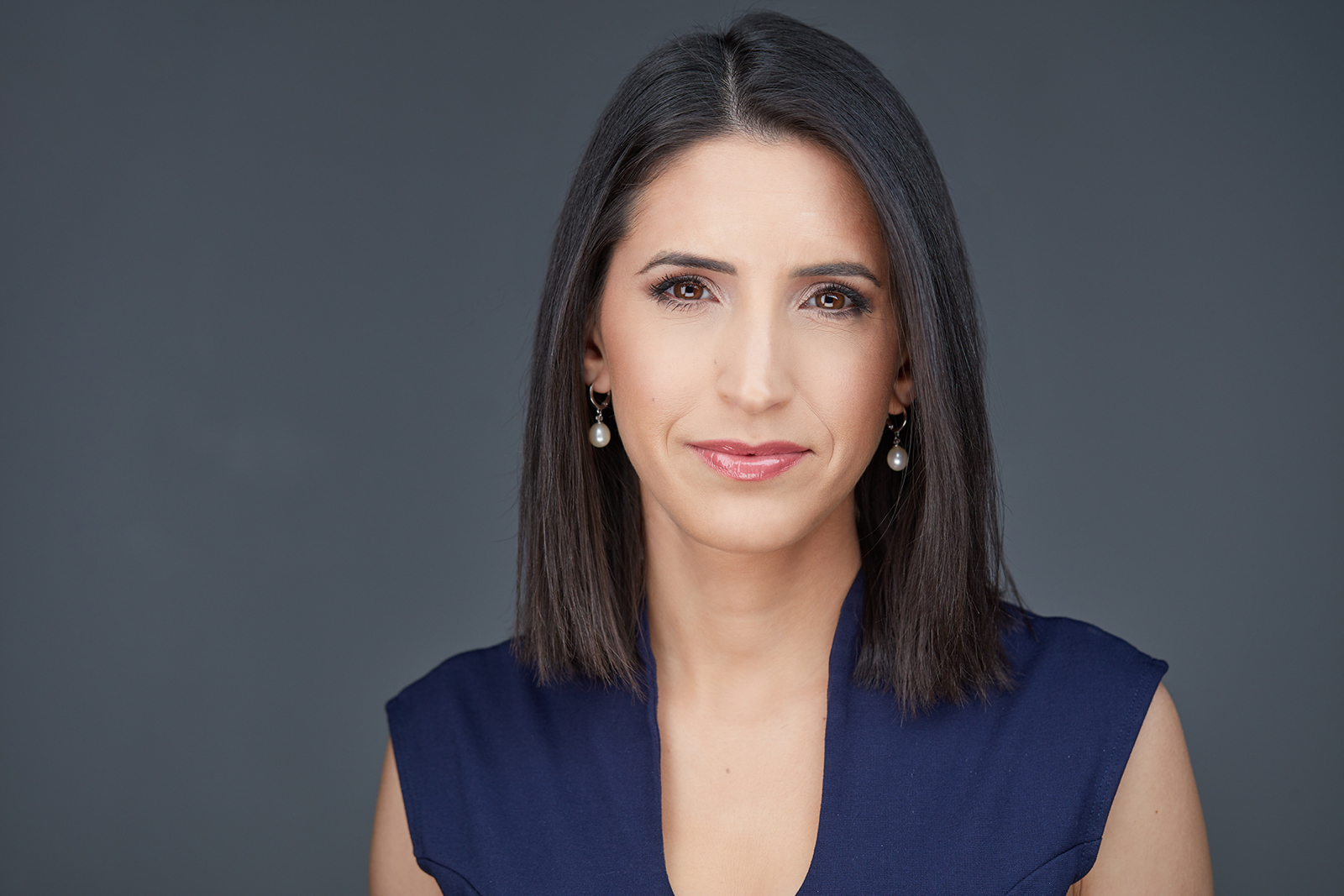
Tal Heinrich. (Courtesy photo)
Tal Heinrich, a long-term Israeli journalist turned spokesperson for Israeli Prime Minister Benjamin Netanyahu, said evangelical leaders are allies who share the same values as Israel’s leaders. They both have “moral clarity” about why Israel is fighting Hamas, said Heinrich. And evangelicals are willing to back up their belief in the importance of Israel with action — which is exactly what Israel needs at this moment.
“We will not stop fighting for a lack of support. But it’s a nice thing to have — knowing that you are not alone,” she said, adding that evangelical broadcasters have a role to play at this moment.
“We need you to speak the truth,” she said. “Don’t let anyone forget what happened. Don’t let anyone forget why Israel is fighting.”
For hostages’ family members, like Lavi, the goal is more personal. They want to make sure the more than 130 remaining hostages are not forgotten as the war drags on and political pressure for a cease-fire grows. Lavi said he hoped the evangelical leaders and broadcasters he met with would share the stories about those still missing as widely as possible.
“We try to ensure that this remains at the top of the agenda for decision-makers,” he said.
He compared the medallion he wears as a reminder of his brother-in-law to the fictional ring of power featured in the Lord of the Rings books. That ring became a heavy burden for whoever carried it.
Likewise, bearing witness to the hostages is a burden for families — one Lavi hopes will be lifted when hostages like his brother-in-law come home.
“I wear it every day,” he said, referring to the medallion. “I can’t wait to take it off.”
